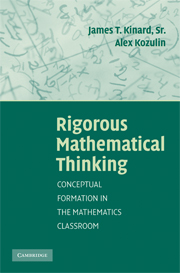Book contents
- Frontmatter
- Contents
- Introduction
- 1 Culture of Mathematics
- 2 Goals and Objectives of Mathematics Education
- 3 Vygotsky's Sociocultural Theory and Mathematics Learning
- 4 Mediated Learning and Cognitive Functions
- 5 Mathematical Concept Formation and Cognitive Tools
- 6 RMT Application, Assessment, and Evaluation
- Conclusion
- References
- Index
Conclusion
Published online by Cambridge University Press: 05 June 2012
- Frontmatter
- Contents
- Introduction
- 1 Culture of Mathematics
- 2 Goals and Objectives of Mathematics Education
- 3 Vygotsky's Sociocultural Theory and Mathematics Learning
- 4 Mediated Learning and Cognitive Functions
- 5 Mathematical Concept Formation and Cognitive Tools
- 6 RMT Application, Assessment, and Evaluation
- Conclusion
- References
- Index
Summary
We started our quest for rigorous mathematical thinking with a question of what constitutes the core of mathematical culture and how this culture can be appropriated and internalized by students in the mathematics classroom. A brief review of various reform attempts made since the 1960s demonstrates that in spite of good intentions of many reformers mathematics education in the United States is still suffering from three major problems: the standards of mathematics education are set in terms of products rather than processes, the cognitive prerequisites of efficient mathematical learning do not receive proper attention, and the activities taking place in mathematical classrooms rarely foster the development of students' reflective and rigorous mathematical reasoning. In this sense many of these activities do not qualify to be called “learning activities” in a proper sense because they do not lead students toward becoming self-regulated and independent learners. Though all students suffer from the above-mentioned educational inadequacy, those from socially underprivileged groups suffer more because their immediate environment does not offer compensatory mechanisms available to more privileged students.
We then proposed a blueprint for the development of the Rigorous Mathematical Thinking (RMT) paradigm based on a double theoretical foundation of Vygotsky's (1986) concept of psychological tools and Feuerstein's (1990) notion of mediated learning experience. Vygotsky envisaged human cognitive functions as shaped by the sociocultural tools and interactions available in given society.
Information
- Type
- Chapter
- Information
- Rigorous Mathematical ThinkingConceptual Formation in the Mathematics Classroom, pp. 193 - 196Publisher: Cambridge University PressPrint publication year: 2008
